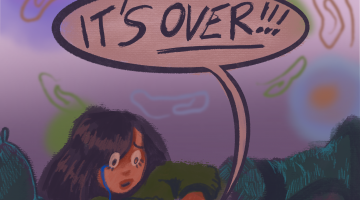Early Monday morning people in the Reno community woke up to close to 8 inches of snow and a plethora of road and weather reports warning people to stay away from freeways and be cautious of flight delays.
The Nevada Highway Patrol reported 33 car crashes, with eight of those causing injury, according to the Reno Gazette-Journal. In addition, there were what NHP spokesman Dave Gibson deemed “countless” reports of vehicles left on sides of the road.
KRNV News 4 and KOLO 8 both reported nine flight delays and the hazardous road conditions. While local authorities and news outlets advised people to stay off the roads, our university took to social media and announced, “Campus remains open and on its regular operating schedule today, Monday, March 28. Please use abundant caution as you travel to campus.”
The decision to keep UNR’s campus open is one that reflects a maddening disregard for students’ safety. Students and community members took to social media to express their anger over the administration’s decision to keep campus open, and rightly so.
When class schedules are maintained in the wake of dangerous weather conditions, it places students who must commute to campus in the difficult position of choosing between their safety and their academic success. We attend a university with a diverse student body, representative of many living situations and economic backgrounds. Making decisions that seem to only cater to students who are able to walk to class is terribly short-sighted and does not illustrate a true concern for students’ academic, economic or physical welfare.
Though some instructors recognized the recklessness of requiring students to brave the storm, those that did not may well impose academic penalties on students who could not make it to class. No one should have to risk life and limb to commute to campus for fear of having their grade lowered.
Dangerous road conditions present risk for every motorist, but they can be especially consequential for students. A wrecked or damaged car, or medical bills for an injury, can be economically detrimental to students with limited income. An inoperable vehicle can have a myriad of secondary effects — future academic absences, an inability to commute to a job or even difficulty caring for children or other family members.
Granted, college courses require a dedication to attendance as well as adherence to a schedule of lectures and assignments. Being a full-time student is much like having a full-time job, and an employer would not cancel a work day. It’s bad for business and overall productivity. The university does have a set academic calendar that is developed months in advance, and unlike the Washoe County School District, the university is not allotted time for “make-up” days. If the university were to cancel classes it would make it hard on faculty and students to make up that class day and potentially impede the course as a whole. Some campuses in the Midwest experience 10 times what Reno experienced on Monday, and campuses remain open.
However, this university pulls students from snowless climates such as in southern Nevada and the Bay Area, and the inexperience in commuting in snow can heighten the hazardousness. And regardless of the administration’s reasoning for keeping campus open, it must be acknowledged that students are still furious.
It didn’t take long for students to flood social media with angry posts in regard to the weather. It may be a bit dramatic to some, but there were students and faculty who risked their lives driving to school on Monday, and something needs to be done about this.
The students have spoken, and they want their well-being to be considered the next time the university decides to keep campus open in hazardous weather conditions.
The Nevada Sagebrush editorial board can be reached at tbynum@sagebrush.unr.edu and on Twitter @TheSagebrush.










